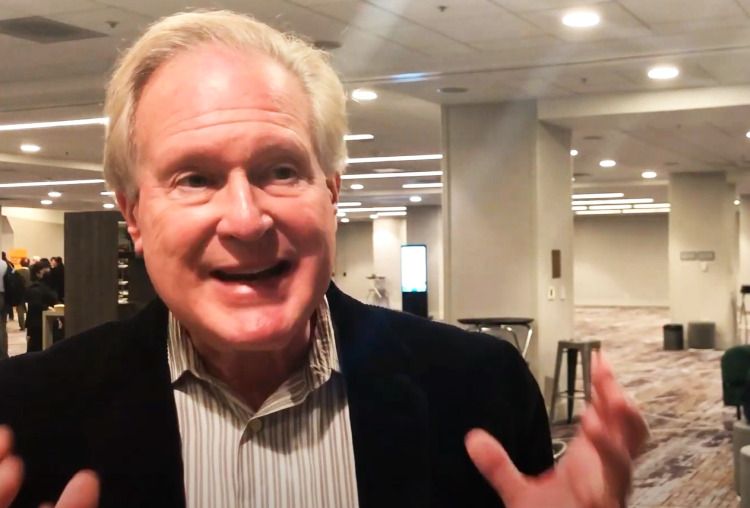A fiber-based supplement that can reduce the absorption of sugars in foods could help lower the glycemic impact of processed foods and deliver digestive benefits, claims San Francisco-based startup BioLumen.
Cofounded by Paolo Costa and Dr Robert Lustig, a pediatric endocrinologist and author of popular science books including ‘Fat Chance: Beating the Odds against Sugar, Processed Food, Obesity, and Disease,’ BioLumen combines soluble and insoluble fibers to form microscopic “micro-cellulose sponges” that expand in the stomach.
The fibers can be consumed as a tablet with food, as a powdered supplement to consume with a meal, or formulated into foods from chocolate and ice cream to cookies, said Dr. Lustig, who caught up with AFN at the Future Food Tech conference in San Francisco.
“You don’t even know it’s there because it’s colorless, odorless, tasteless, and texture-less.”
When the sponge expands, he said, “It exposes the nooks and crannies where the hydrogels, the soluble fibers, are hiding. These then sequester glucose, fructose, sucrose, and simple starches, rendering them unavailable for early absorption in the gut.”
Feeding the gut
The sugar-filled fibrous sponge then navigates partially unabsorbed through the small intestine—where fats and sugars are usually digested and utilized by the body—and arrives in the large intestine.
Here, some of these encapsulated sugars are “released inside the colon, feeding the microbiome and increasing the bacterial production of beneficial short-chain fatty acids [a prebiotic effect], while the rest of the unabsorbed trapped nutrients are naturally excreted [reducing the caloric impact of foods],” he claimed.
“It reduces absorption of glucose by 36%, fructose by 38%, sucrose by 42%, and simple starches by 9%, thus reducing the glycemic excursion thereby reducing the insulin response, thereby maintaining insulin sensitivity.
“In addition, because that food moves through the intestine mostly unabsorbed, the microbiome has a chance to chew it instead. We know we’re feeding the gut because we have a 60% increase in short chain fatty acid production [in the large intestine].”
In vitro data from SHIME (Simulator of the Human Intestinal Microbial Ecosystem)
So what evidence does BioLumen have to support the above hypothesis?
“We have in vitro data using the SHIME system [an in vitro simulator model of the human digestive system] and we now have a little bit of human data, at least for acute administration,” said Lustig. “We are now conducting clinical trials to get more long-term data.”
He added: “We don’t have data on weight loss yet; we are doing clinical trials very specifically to look at that question. But we do have data on gut health and we do have data on caloric balance, and so far, we have seen only benefits.
“One question is if you increase fiber, will you increase gastric distension or cause diarrhea? We know that we increase carbon dioxide production by 15% over control, which means it’s working and at 15%, we don’t anticipate any significant or meaningful side effects. Those people who have taken BioLumen so far have experienced no GI distress, and no changes in stool consistency.”
‘The difference is that we are structured… It’s not just strings of fibers’
So what’s special about the fibers in BioLumen, which was one of 10 startups selected by PepsiCo to participate in the fifth cohort of its Greenhouse Accelerator program?
“BioLumen is a combination of natural polysaccharides,” said cofounder Paolo Costa, who said BioLumen has thus far raised $5.5 million from undisclosed private investors.
“The difference is that we are structured. That’s the key. It’s not just strings of fibers. We have six granted patents and expect copycats are going to have a hard time circumventing our IP.”
Asked how BioLumen compares to other commercially available fibers on the market such as inulin, Dr. Lustig said: “Every fiber that’s on the market today is a soluble fiber, whether it’s psyllium, pectin, inulin.
“Those are all globular, those are miscible, so you can put them into food, you can bake them into food, and that’s all well and good, but soluble fiber only does two things that benefits the gut. BioLumen, because it’s a soluble/insoluble fiber matrix, does six things to help the gut.”
As for the business model, he said, “We’re going to go direct to consumer as a supplement sachet or capsule and we will also work b2b, engaging in partnerships with other companies to be able to incorporate BioLumen into their foods, which is why we’re here at Future Food Tech.”
Costa added: “We’ve had a lot of requests for samples and we have got some NDAs in place, but we are moving cautiously and looking for a few trusted partners.”





